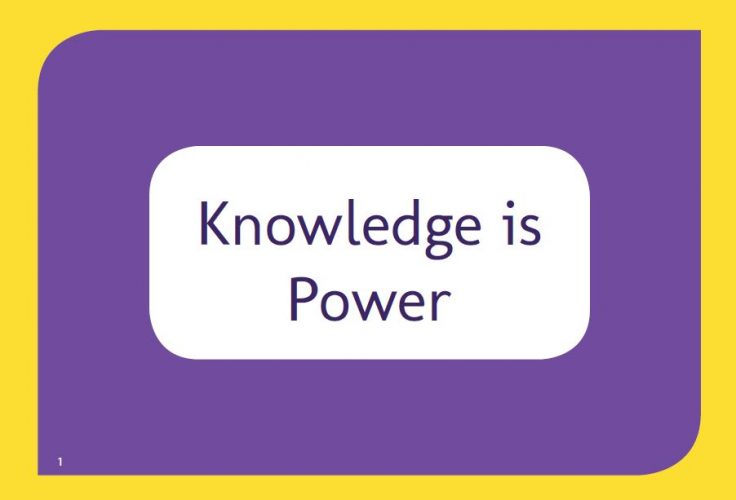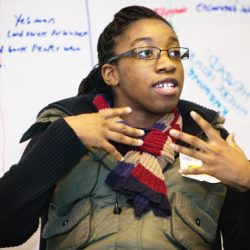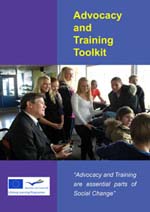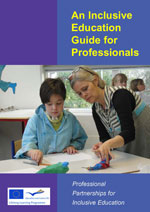“Knowledge is Power” participation toolkit
Designed for use by Disabled People’s Organisations with Disabled young people, this toolkit has session plans for understanding identity, developing skills & building confidence.

Despite policy guidance, Disabled young people are still not getting the chance to make decisions about their lives, and Disabled People’s Organisations (DPOs) are struggling to do this work with them. The toolkit is designed to help DPOs engage with Disabled young people around this issue so that they can become empowered Disabled adults. The toolkit includes sections on Disability and Identity, decision making, and working together as partners for change. It is designed to have DPOs deliver it alongside a Disabled young person who has a good understanding of Disability issues.
The toolkit has been created by ALLFIE and Common Room and co-designed with Disabled young people, to support Disabled Person Led Organisations (DPOs) to better connect with Disabled young people and build their resilience to participate in decision making.
The toolkit is also an opportunity to assist DPOs to build their own sustainability and to ensure they can stay relevant in the future. Currently, there is no rights and empowerment training programme that has been designed to be delivered by Disabled adults and Disabled young people so we hope you will welcome this exciting new training opportunity! It is a chance to step into the future and educate Disabled young people about the power they have and their rights!
You may also be interested in “Hear Us Out” – the VIPER guide to young people’s participation in decision making.
The Case for Inclusive Education
A handy guide to the what, why and how
What is inclusive education? Why is it of benefit to all learners? How can we transform the current education system? This downloadable pdf (or text only version) explains in a nutshell. Print it out and pass it on.
“Hear Us Out”
This VIPER guide to participation looks at the steps organisations should follow when creating participation opportunities for groups of Disabled young people.
We have written this guide because many people we’ve spoken to including voluntary sector organisations, local authorities and health bodies said they wanted to learn how to involve young Disabled people in decision making, and that they wanted to learn about what works directly from young Disabled people themselves. This guide is based on our own experiences from the VIPER project and on the evidence we gathered through our national research project.
We think there should be more opportunities for young Disabled people to be involved in decision making about services. All young Disabled people can be included and participate if we change attitudes. We hope people will use this guide to make that happen.
We suggest you also look at our “Knowledge is Power” toolkit for Disabled People’s Organisations involving young people in their work.
Advocacy and Training Toolkit
This is a toolkit to support advocacy and training work led by Disabled people.
The toolkit was developed in 2011 by Disabled people from France, Italy, Iceland and the UK and is based on learning and evidence from visits to each of these countries. The toolkit offers information and advice to Disabled people across Europe to encourage their participation and leadership in the implementation of inclusive education for Disabled children and young people. The Advocacy & Training toolkit was funded by Grundtvig.
An Inclusive Education Guide for Professionals
This guide was written in 2011 by education and social care professionals from France, Italy, Romania, Iceland and the UK and is based on evidence and learning from each of these countries about what works for the inclusion of disabled children and young people in mainstream education.
The guide offers practical advice and information to those professionals already working with disabled children and their families and also to those professionals unfamiliar with this area of work. It is based on learning and evidence from visits to each of these countries and was funded by Leonardo.
An Inclusive Education Guide for Families
This guide is aimed at helping families seek inclusive education opportunities for their Disabled child.
Written by Linda Whitehead in 2011, it encourages families to think of themselves as allies to their Disabled children by thinking about Disability in a positive way using the Social Model of Disability. The guide will help families ask the right questions of schools and to be more confident in seeking out a school that is inclusive of all children from the local community. The guide is based on learning and evidence from visits to various countries and was funded by Grundtvig.
Inclusion Standards Guide
A document to help organisations make decisions about meeting disabled people’s access requirements during events
“Who’s On My Side?”
How can I best support a Disabled child? In this video Disabled children and young people and those around them talk about the kind of help they really need: the support of allies.
“For anyone who supports people with disabilities, the important thing to know is that we all want to make decisions and to succeed just like everybody else. If they really want to know what people need, just ask them, treat them like people who know what they’re doing and people who know what they need.”
In this video, made by ALLFIE and Parents for Inclusion in 2010, young Disabled people and those around them talk about the kind of help that will really support them to grow and be autonomous.
Pushing for Change
A report on the role of Disabled People’s Organisations in developing young Disabled leaders of the future.
 This report looks at some of the ways different organisations are including young Disabled people and encouraging their leadership and includes the voices and experiences of young Disabled people on leadership matters.
This report looks at some of the ways different organisations are including young Disabled people and encouraging their leadership and includes the voices and experiences of young Disabled people on leadership matters.
The report highlights that young Disabled people need to feel part of their communities, families and peer groups if they are to feel confident to seek out leadership roles. The research shows that young people want more choice and control in their lives so they can be leaders.
Archived resources
Here are old resources which may be out of date but still useful or of historical interest
- Campaigns in Action – 2011 campaign guide celebrating some of the historic victories won by Disabled people standing up for equality and inclusion.
- Inclusion Assistant Training Pack. This pack was produced in 2007 for supporters of young people with high level needs in mainstream education.
- Forced Apart – the case for ending compulsory segregation in education, c 1997.
![Allfie [logo]](https://www.allfie.org.uk/wp-content/themes/allfie-base-theme/assets/img/allfie-logo-original.svg)






